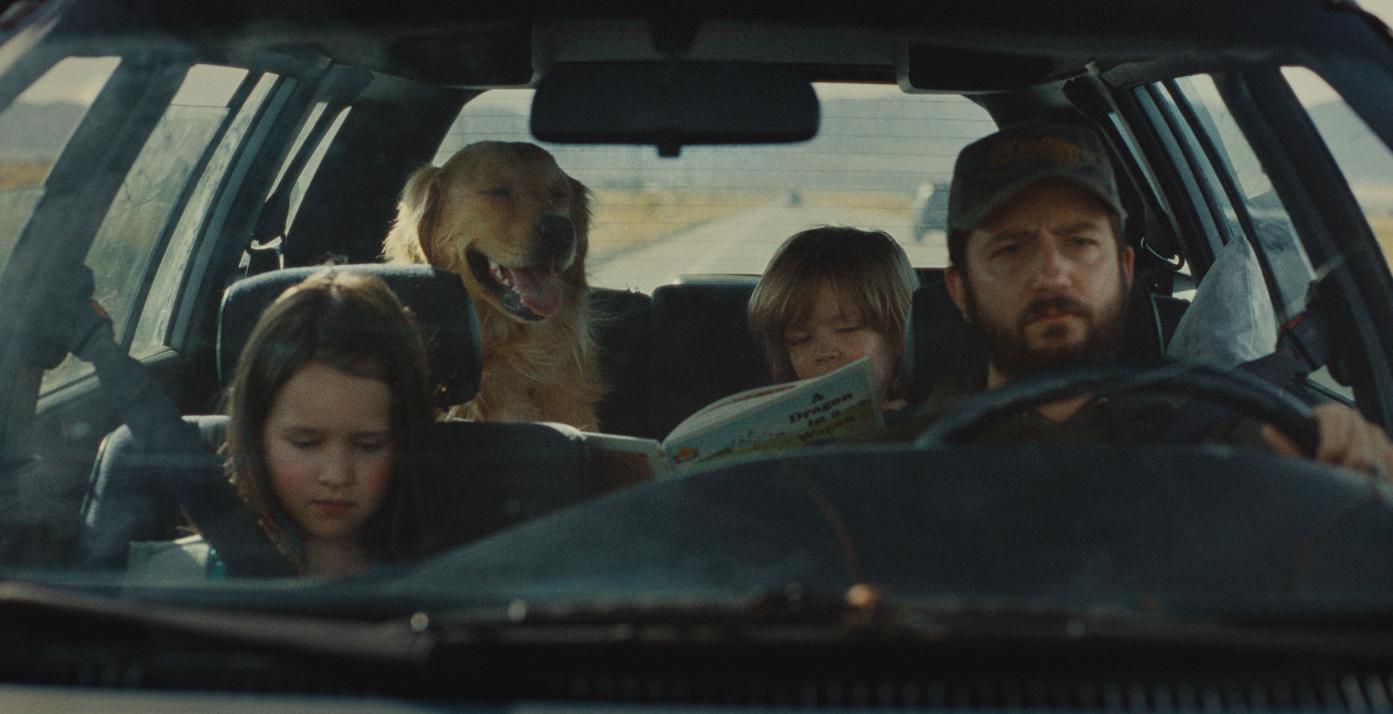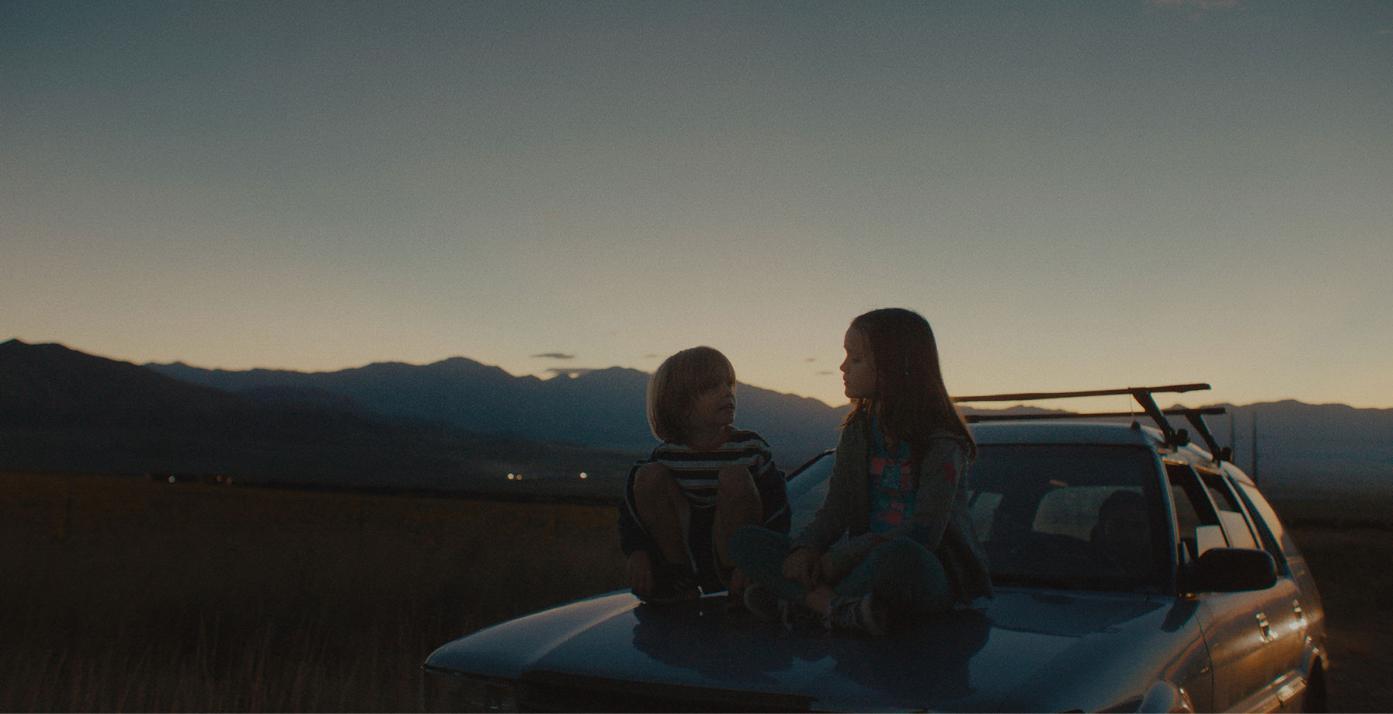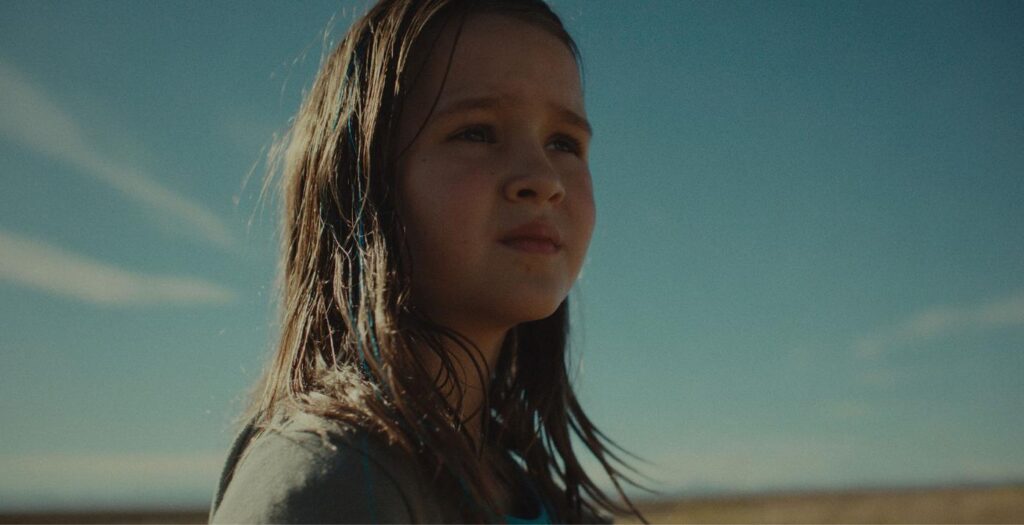Omaha (2025) is director Cole Webley‘s directorial feature debut, with a screenplay from Sundance-alum Robert Machoian. The film follows an unnamed father and his two children, Ella and Charlie, in the wake of a family tragedy. Pushed from their house, the film opens with the dad telling each child to pick one significant thing to take with them as they leave the house. What follows is a somber adventure through America with Nebraska as their end destination.
The journey across the country allows the small family to experience things they never had before. But with each mile they travel, Ella begins to understand that this road trip isn’t a vacation for fun but that they’re approaching a new life, one that doesn’t involve them all. Ella tries to protect her younger brother, and the dad ultimately begins to let the mask slip more and more with every subsequent rest stop.
As a whole, Omaha is a no-frills film. The camera highlights its subjects without any grandstanding. The film captures heartache and intimately looks at the family with empathy first. As a road trip film, our tie with the family doesn’t involve long expository moments detailing their lives or histories. All we know is this moment in time and the small memories that resurface across the drive, brief glimpses into their relationships.
Omaha (2025) captures a heartbreaking reality through one family’s road trip across the US.

Throughout the drive, the children and their dog display hope and a sense of adventure. They’re happy, and only the audience and their father know that everything isn’t what it seems. To Ella and Charlie, they’re on a family vacation. But the loneliness and sadness that moves under all of the dad’s choices and interactions is almost suffocating. When their stop at a gas station shows the audience and the children the reality of what’s happening, it feels like the air has been sucked out of the room.
Director Cole Webley’s kindness and thoughtful attention to telling a story that could easily devolve into moral grandstanding instead of compassionate exploration meet the stark reality that Machoian’s script represents. While thoughtful filmmaking is key, it’s the performances from all three primary actors that make Omaha one of the most powerful films of the festival.
As Ella and Charlie, Molly Belle Wright and Wyatt Solis are breathtaking. Their innocence and their sibling relationship are the core of the film. This is especially true as Ella and Charlie’s perspectives on the road trip begin to diverge.
Charlie can keep thinking about the vacation their father is presenting. However, Ella begins to understand what’s happening. When they’re separated from the family dog, the reality that life will never be the same is evident. In the film’s climax, the way the two children exit the car is different, and that makes it deeply heartbreaking.
Each performance in Omaha (2025) is gorgeously salient, leading with vulnerability.

While the children are the film’s beating heart, John Magaro‘s performance is among the best of the Sundance Film Festival, where the movie celebrated its world premiere. With the film’s light dialogue, he ensures the audience knows exactly who this father is. The grief, the love, the weight of his choices. Magaro paints a portrait as intricate as it is intimate. This is a salient look at a father without resources or support.
When Omaha first ended, I felt angry. Not at the father or even what I just watched. But because of the statistics that the film closes with. Why is it okay to give away a child as an infant because you can not care for it? Why is it criminal to do so with an older child? Why is one thinking of the child’s interest and the other abandonment? I was angry because the words at the end of the film, presented without judgment and just as a statement of fact, made me think about the differences for the first time.
Omaha pushes its audience to think about the events leading up to leaving your children—the misfortune, the struggle, and, most importantly, the love. There is never a question of whether this dad loves his children. Instead, we’re presented with what to do when we have no support to take care of them, no home to house them, and no money to feed them. Robert Machoian’s screenplay isn’t concerned with casting blame but rather with highlighting that this is a reality for many.
Omaha is a family portrait you can’t pull your eyes away from. With beautiful and raw performances from the entire cast, this film embraces subtlety with care, using its silence to craft its emotional narrative just as much as its dialogue.
Omaha (2025) premiered as part of the 2025 Sundance Film Festival.
Omaha (2025)
-
Rating - 9.5/109.5/10
TL;DR
Omaha is a family portrait you can’t pull your eyes away from. With beautiful and raw performances from the entire cast, this film embraces subtlety with care, using its silence to craft its emotional narrative just as much as its dialogue.







